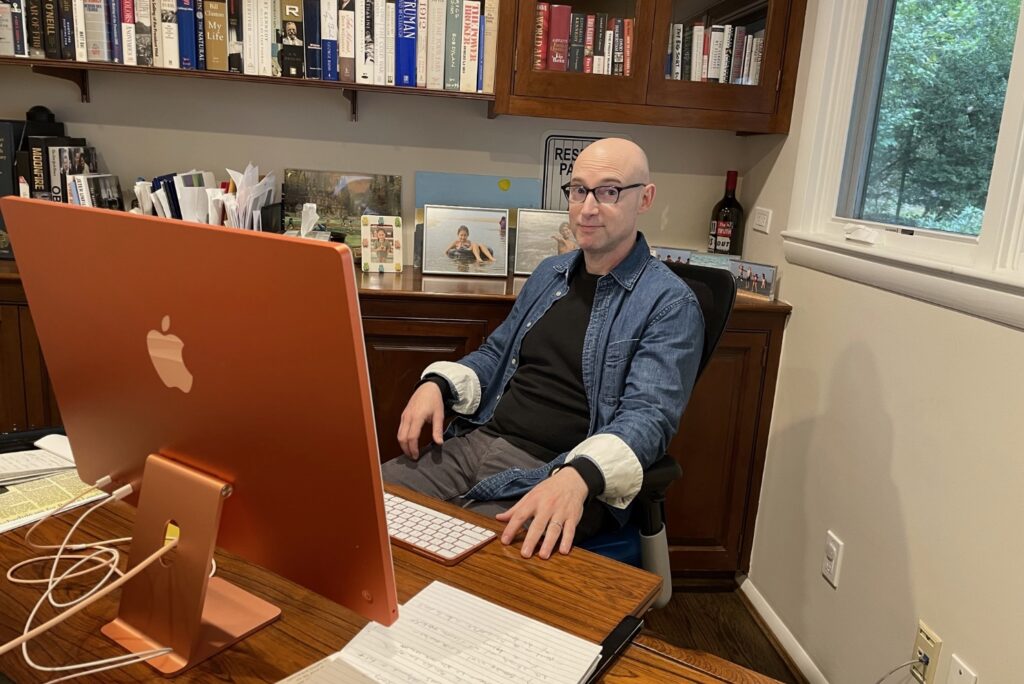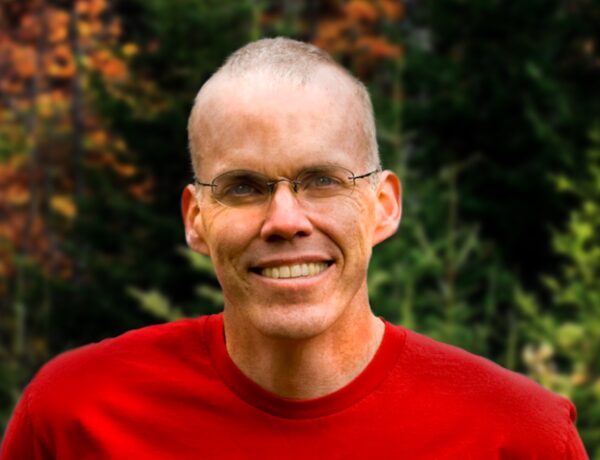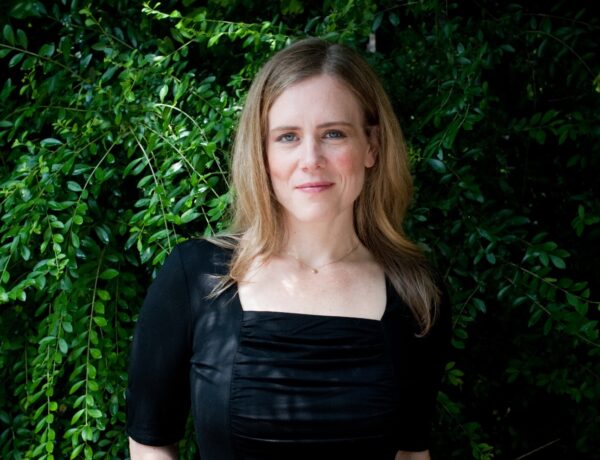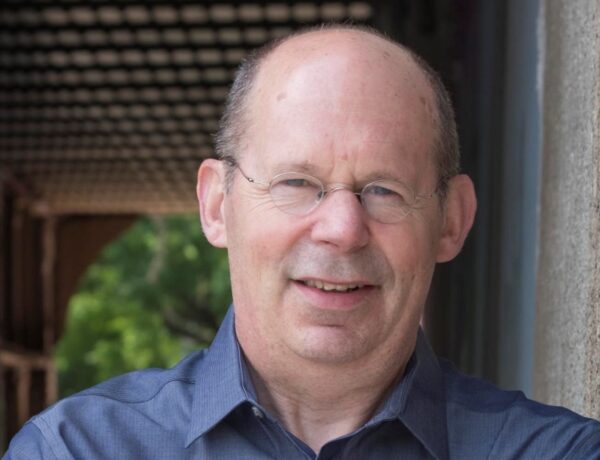Matt Bai is an American journalist, author, and screenwriter. He’s also a contributing columnist for The Washington Post.
From 2002 to 2013, he covered politics for The New York Times, where he was chief political writer for the Sunday magazine and a columnist for the newspaper. He then spent five years as the national political columnist for Yahoo News.
Matt is the author of two books, The Argument: Billionaires, Bloggers and the Battle to Remake Democratic Politics, and All the Truth is Out: The Week Politics Went Tabloid, which was selected as one of the year’s best books by NPR and Amazon. He co-wrote the feature film adaptation of the book, The Front Runner, which starred Hugh Jackman as Senator Gary Hart.
Each week, we publish a new daily writing routine from a famous author. Subscribe to our newsletter so you don’t miss out!
Hi Matt, welcome to Famous Writing Routines, great to have you here with us today! Your 2015 book, All The Truth Is Out, explores the week politics went tabloid. Can you tell us more about the inspiration for this book and how you went about researching and writing it?
I’m honored to be asked, so thanks for having me. I think your site is very cool.
Sometimes you don’t choose stories so much as they choose you, if that makes any sense. I met Gary Hart twenty years ago now, and the few days I spent with him then really stayed with me, especially as I watched our political culture deteriorate. I became convinced there was a connection to be made there, something more that needed to be said. It became a kind of obsession. I sat with the idea for several years, but I probably wrote it in eight months.
What do you think were the long-lasting effects of the Hart affair on American politics and media?
The book ended up being a critique of my own industry, but I didn’t realize that until I was finished. I feel like that moment in 1987 was a turning point for political journalism — it’s when we started treating our politicians more like celebrities. And if you treat politicians like celebrities, you will inevitably get celebrities as politicians. That was my central point, and of course I never imagined how literally that would come to pass with Donald Trump.
In your opinion, how do you see the relationship between politics and media evolving in the future?
Well, that’s more clairvoyance than opinion, and I’m not a very good clairvoyant. Right now I feel like it’s very broken — I used to spend tons of time with politicians, and I don’t think any reporter can really do that anymore. I also feel like they flat out lie more often than they used to. It’s really up to the voters to decide whether that’s something they care about.
You co-wrote the screenplay for The Front Runner which is based on the book. Can you tell us more about that process? How did it feel to see your work adapted into a feature film starring a major Hollywood actor like Hugh Jackman?
That was really one of the great experiences of my life. “Magical” is the word that comes to mind. Hugh is an amazing person and actor, and Jason Reitman became a good friend and taught me a ton about screenwriting. Everyone associated with the film had a blast making it.
It’s a shame that very few people saw the picture, or even knew about it, but commercial success is something you just can’t control, in books or movies or any kind of writing. I always recommend the film to people because I think it’s excellent and one of Hugh’s best performances.
Do you struggle to stay focused while writing? You’re not alone! That’s why Famous Writing Routines recommends Freedom – the ultimate app and website blocker for Mac, Windows, Android, iOS, and Chrome. With over 2.5 million users, Freedom helps writers stay on task and avoid distractions. Get started for free today and reclaim your productivity!
Your work often explores the intersection of politics and culture. How do you think these two areas of our lives influence one another, and why is it important to examine that relationship?
That’s true. We tend to describe our politicians as leaders, but actually they’re followers, and that’s by design. Our government is designed to be responsive to the mood of the people — however the country is changing, Washington is almost always the last to reflect it. So if you want to know where politics is headed, you need to understand the trends in business and technology and entertainment. I try to connect all that.
You currently write a column for The Washington Post. How do you decide what topics to write about each week, and how do you approach writing about political issues in a way that’s accessible to a broad audience?
Most often I see something in the news and it jars a thought or a memory, and an argument takes shape. Sometimes my editors will have a topic they’d like me to think about, which I like. I’ve always written about politics — in magazines or books or columns — as if I were speaking to a friend, someone with a genuinely open mind who wants to wrestle with the complexity of an issue, as I do. I know a lot of columnists now make their living preaching to the same choir over and over. Honestly, that would bore the crap out of me.
In addition to your work as a journalist and author, you’re also a screenwriter. How do you think writing for the screen differs from other forms of writing, and what do you enjoy about the process of writing for film?
I never really aspired to be a screenwriter, but now I love it. It’s incredibly fun as a writer to be able to learn a new format and get better at it. And I enjoy being untethered from reality for a change. Plus you don’t get to write sex scenes in a column.
As a seasoned journalist and author, what advice would you give to aspiring writers and journalists looking to make an impact in the industry?
I think that’s a way of saying I’m old? I actually struggle with this question. The economic models have changed so much that I just don’t understand how people get started in the business now. How do you teach people to be reporters when there aren’t any small papers? How do they learn to be great writers when “longform” can be 500 words? I think if I were starting out now, I’d be laser focused on finding a talented editor who could help me refine my skills. Where you write is less important than for whom you write. The craft doesn’t teach itself.
Can you tell us about your writing routine? What does a typical day look like for you?
One of the things I love about my current existence is that there is no typical day. Some days I’m a columnist. Some days I’m a screenwriter. Some days I’m driving my kids to sports or the doctor. Today I answered reader mail and talked with my Post editor about a long essay I’m finishing, and then I worked with my producer on a movie pitch we’re doing, and now I’m talking to you. Pretty great, right?
My writing routines changed when we adopted a puppy during the pandemic. Now I spend mornings at the dog park, and then I eat breakfast and read the papers and do the Times crossword, and then I’m pretty much using the rest of the morning to organize my thoughts and exercise. Afternoon is when I’m usually cranking away on something. Most writing happens in your head, anyway, and not on the page, so even when I’m walking my dog, I’m getting work done.
If you could have a conversation with any author throughout history about their writing routine and creative process, who would that person be?
Probably Bob Dylan. He’s the famous person I haven’t met whom I’d most like to meet (followed closely by Derek Jeter). I’m just fascinated by how that kind of genius operates. Like, is he sitting at his kitchen counter and suddenly “Tangled Up in Blue” pops into his head? Or is he fiddling with a melody and then has to find a story for it? I think such a large part of creativity is just learning to clear your head long enough for the words or ideas to make themselves heard.
I’d love to know about the books you’re reading at the moment. What have been some of your favorite recent reads?
I recently read Ian McEwan’s Lessons, which was beautiful, and I’ve got a few pages left in Andrew Sean Greer’s Less, which I’ve really enjoyed, too. In between those two, I read Bo Jackson’s autobiography from the 1990s, and I also read an advance copy of Mark Bowden’s forthcoming book, Life Sentence, which is absolutely brilliant.
Sometimes when I read something not good, it throws me out of my reading groove and I have trouble getting restarted. That’s when I reach for Haruki Murikami, who can always pull me into a story immediately. Most recently I read 1Q84, which is wild. Murikami taught at Tufts not long before I was a student there, and I really wish I’d been able to take his class, so he’s another famous writer I’d like to meet.
What does your current writing workspace look like?
I have a standing aspiration to go paperless, but I never quite get there. So my desk of the last 20 years — a Danish modern thing I bought at a consignment store in Washington — consists of a 24-inch Mac, a laptop, and some piles of paper related to various projects.
I’m also drowning in books, even though I tend to read digitally now, because people keep sending them to me. On my walls I’ve got a couple of framed New York Times Magazine covers, and the first Times crossword in which my name was an answer, and some “Front Runner” memorabilia.
My office is off the entrance to our house, and my desk faces the door, so my kids can’t slip in or out without having to say hello or goodbye, which is how I like it.

Affiliate disclaimer: Some links on this website are affiliate links. We may earn a small commission if you make a purchase through these links, but only promote products we truly believe in. We disclose affiliate links and give honest reviews.



No Comments